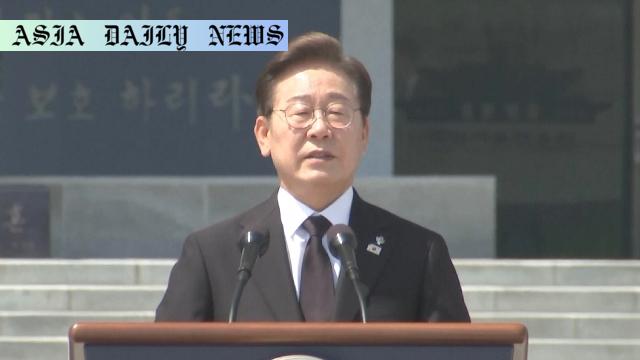Memorial Day Speech: South Korea’s president focuses on peace, avoids mentioning North Korea, marking a significant policy shift.
South Korean President Lee Jae-myung delivered a Memorial Day speech.
North Korea was notably excluded, showcasing a shift in priorities.
Lee emphasized peace, democracy, and progress over military-focused rhetoric.
The approach marks a stark departure from predecessor Yoon Suk-yeol’s tone.
Lee proposed opening a communication channel with North Korea.

A New Vision for Memorial Day
South Korea’s newly appointed president, Lee Jae-myung, chose a unique path during his Memorial Day address at Seoul National Cemetery. Unlike his predecessor’s approach, Lee avoided any mention of North Korea, a departure that reflects his administration’s shift in tone and focus. Commemorating the lives lost in the Korean War, Lee urged for the creation of a peaceful nation that thrives on prosperity, democracy, and dignity, profoundly resonating with those eager for stability on the Korean Peninsula.
This strategic avoidance of references to North Korea in the speech underscores Lee’s intent to champion peace and dialogue over confrontation. While some consider this a bold move, it aligns with his campaign promises of establishing mechanisms for collaboration with North Korea. Lee’s speech is not just a remembrance of the fallen but also a promise to build a nation free from the shadow of conflict, reflecting principles of reconciliation and progress.
Contrasting Styles: Lee Jae-myung vs. Yoon Suk-yeol
Lee’s approach is a stark departure from former president Yoon Suk-yeol, who, in past Memorial Day speeches, highlighted the threat posed by North Korea. Yoon’s rhetoric often called for stronger defensive measures and condemned Pyongyang’s actions. On the other hand, Lee appears to advocate for dialogue and understanding based on mutual respect and cooperation.
This pivotal change signifies a potential resurgence of diplomacy in South Korea’s foreign policy. By excluding combative rhetoric, Lee aims to lower tensions and create space for peaceful discourse. In a politically charged landscape where military posturing often dominates, this shift serves as a counter-narrative that invites open communication and reduces animosity.
Opening Doors for Peaceful Coexistence
Lee’s vision transcends traditional diplomacy by laying the groundwork for practical reconciliation mechanisms. In his speech, he proposed establishing a communication channel with the North as a key step toward ensuring stability. Acknowledging the sacrifices of the war dead, he committed to paving a path that prevents future generations from enduring similar hardships. His speech advocates for a nation that grows through peace — a sentiment that resonates not only domestically but also on the international stage.
This policy direction opens new opportunities for inter-Korean relations. While critics may argue it risks appearing too lenient, proponents applaud Lee for daring to move away from conventional hardline stances. His approach reflects a calculated effort to establish South Korea as a beacon of peace in Northeast Asia, potentially influencing regional stability positively.
Implications for the Korean Peninsula
Lee’s decision to focus on building a democratic and prosperous nation through a framework of robust peace has significant regional and global repercussions. It signifies a redefinition of South Korea’s priorities from militarization to modernization, emphasizing dialogue over discord. This change in rhetoric could also pressure North Korea to potentially adjust its hardline stance.
A critical question remains—how will Pyongyang respond? If Lee’s government successfully initiates dialogue, it could be the catalyst for breaking away from decades of hostility. However, the risks of misinterpretation and refusal also loom large. Nonetheless, Lee’s Memorial Day speech offers a refreshing perspective on how South Korea is ready to redefine its role in global politics, pitting empathy and collaboration against antagonism.



Commentary
A Thoughtful Shift in Leadership Attitude
President Lee Jae-myung’s Memorial Day speech marks a pivotal moment in South Korea’s history, showcasing the leadership’s ability to adapt to changing times. Choosing not to mention North Korea breaks away from decades of tradition in such speeches. Rather than being a statement of omission, this move speaks volumes about Lee’s intent to reshape not just South Korea’s domestic outlook, but also its foreign relations.
It is not uncommon for leaders to make bold statements in their addresses. However, a calculated move to exclude North Korea in such a symbolic moment demonstrates foresight. Lee’s speech focused on celebrating the nation’s democratic ideals and economic successes built on peace, sending a powerful message to both citizens and the international community. Lee’s address reflected his administration’s confidence in their ability to handle complex geopolitical realities with a focus on dialogue and partnership.
What Lies Ahead for Inter-Korean Relations
Lee’s proposal to establish a communication channel with North Korea signifies hope but also caution. While the notion of peaceful dialogue is noble, it rarely comes without challenges. History has shown that Pyongyang can be unpredictable, with tensions flaring at the slightest misunderstanding. Therefore, the road toward reconciliation is undoubtedly rocky, requiring resilient diplomacy, realism, and tact.
Nonetheless, Lee’s Memorial Day speech brings optimism. His rejection of combative posturing in favor of pragmatic action resonates with a global audience weary of constant conflict. As global discourse shifts toward collaboration, Lee’s stance positions South Korea as a potential leader in peace diplomacy within the region. His speech sends a resonant message—one that promotes progress while honoring the past.